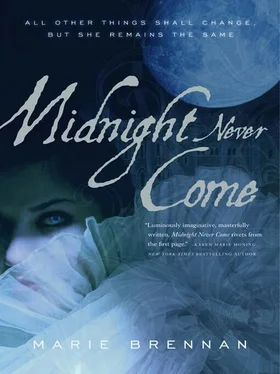Deven knew this very well; he had done some of that work in the Low Countries. Though not the most sordid parts of it, to be sure. “He is my most likely prospect for preferment, Father. But I’ll keep my wits about me, I promise.”
With that, his father had to be satisfied.
LONDON AND ISLINGTON: September 18, 1588
Leaving the Onyx Hall was not so simple as Lune might have hoped. In the labyrinthine politics of court, someone would find a way to read her departure as suspicious, should she go out too soon after Invidiana’s sentencing of Cadogant. Vidar, if no one else.
So she wandered for a time through the reaches of the Onyx Hall, watching fae shy away from her company. It was an easy way to fill time; though the subterranean faerie palace was not so large as the city above, it was far larger than any surface building, with passages playing the role of streets, and complexes of chambers given over to different purposes.
In one open-columned hall she found Orpheus again, this time playing dance music; fae clapped as one of their number whirled around with a partner in a frenzied display. Lune placed herself along the wall and watched as a grinning lubberkin dragged a poor, stumbling human girl on, faster and faster. The mortal looked healthy enough, though exhausted; she was probably some maidservant lured down into the Onyx Hall for brief entertainment, and would be returned to the surface in the end, disoriented and drained. Those who had been there for a long time, like Orpheus, acquired a fey look this girl did not yet have.
Their attention was on the dance. Unobserved, Lune slipped across to the other side of the hall and out through another door.
She took a circuitous route, misleading to anyone who might see her passing by, but also necessary; one could not simply go straight to one’s destination. The Onyx Hall connected to the world above in a variety of places, but those places did not match up; two entrances might lie half the city apart on the surface, but side-by-side down below. It was one of the reasons visitors feared the place. Once inside, they might never find their way out again.
But Lune knew her path. Soon enough she entered a small, deserted chamber, where the stone walls of the palace gave way to a descending lacework of roots.
Standing beneath their canopy, she took a deep breath and concentrated.
The rippling, night-sky sapphire of her gown steadied and became plainer blue broadcloth. The gems that decorated it vanished, and the neckline closed up, ending in a modest ruff, with a cap to cover her hair. More difficult was Lune’s own body; she had to focus carefully, weathering her skin, turning her hair from silver to a dull blond, and her shining eyes to a cheerful blue. Fae who were good at this knew attention to detail was what mattered. Leave nothing unchanged, and add those few touches — a mole here, smallpox scars there — that would speak convincingly of ordinary humanity.
But building the illusion was not enough, on its own. Lune reached into the purse that hung from her girdle and brought forth the bread from her coffer.
The coarsely ground barley caught in her teeth; she was careful to swallow it all. As food, she disdained it, but it served its own purpose, and for that it was more precious than gold. When the last bit had been consumed, she reached up and stroked the nearest root.
With a quiet rustle, the tendrils closed around and lifted her up.
She emerged from the trunk of an alder tree that stood along St. Martin’s Lane, no more than a stone’s throw from the structures that had grown like burls from the great arch and surrounding walls of Aldersgate. The time, she was surprised to discover, was early morning. The Onyx Hall did not stand outside human time the way more distant realms did — that would make Invidiana’s favorite games too difficult — but it was easy to lose track of the hour.
Straightening her cap, Lune stepped away from the tree. No one had noticed her coming out of the trunk. It was the final boundary of the Onyx Hall, the last edge of the enchantments that protected the subterranean palace lying unseen below mortal feet; just as the place itself remained undiscovered, so would people not be seen coming and going. But once away from its entrances, the protections ended.
As if to hammer the point home, the bells of St. Paul’s Cathedral rang out the hour from within the tightly packed mass of London. Lune could not repress the tiniest flinch, even as she felt the sound wash over her harmlessly. She had done this countless times before, yet the first test of her own protections always made her nervous.
But she was safe. Fortified by mortal food against the power of mortal faith, she could walk among them, and never fear her true face would be revealed.
Settling into her illusion, Lune set out, walking briskly through the gate and out of London.
The morning was bright, with a crisp breeze that kept her cool as she walked. The houses crowding the lane soon spaced themselves more generously, but there was traffic aplenty, an endless flow of food, travelers, and goods into and out of the city. London was a voracious thing, chewing up more than it spat back out, and in recent years it had begun to swallow the countryside. Lune marveled at the thronging masses who flooded the city until it overflowed, spilling out of its ancient walls and taking root in the formerly green fields that lay without. They lived like ants, building up great hills in which they lived by the hundreds and thousands, and then dying in the blink of an eye.
A mile or so farther out, it was a different matter. The clamor of London faded behind her; ahead, beyond the shooting fields, lay the neighboring village of Islington, with its manor houses and ancient, shading trees. And along the Great North Road, the friendly, welcoming structure of the Angel Inn.
The place was moderately busy, with travelers and servants alike crossing the courtyard that lay between the inn and the stables, but that made Lune’s goal easier; with so many people about, no one took particular notice of one more. She passed by the front entrance and went toward the back, where the hillside was dominated by an enormous rosebush, a tangled, brambly mass even the bravest soul would be afraid to trim back.
This, too, had its own protections. No one was there to watch as Lune cupped a late-blooming rose in her hand and spoke her name into the petals.
Like the roots of the alder tree in London, the thorny branches rustled and moved, forming a braided archway starred with yellow blossoms. Inside the archway were steps, leading down through the earth, their wood worn smooth by countless passing feet. Charmed lights cast a warm glow over the interior. Lune began her descent, and the rosebush closed behind her.
The announcement of her name did not open the bush; it only told the inhabitants someone had come. But visitors were rarely kept waiting, outside or in. By the time Lune reached the bottom of the steps, someone was there.
“Welcome to the Angel, my lady,” Gertrude Goodemeade said, a sunny smile on her round-cheeked face as she bobbed a curtsy. “’Tis always a pleasure to see you here. Come in, please, please!”
No doubt the Goodemeade sisters gave the same friendly greeting to anyone who crossed their threshold — just as, no doubt, more courtiers came here than would admit it — and yet Lune did not doubt the words were sincere. It was in the sisters’ nature. They came from the North originally — brownies were Border hobs, and Gertrude’s voice retained traces of the accent — but they had served the Angel Inn since its construction, and supposedly another inn before that, and on back past what anyone could remember. Many hobs were insular folk, attached to a particular mortal family and unconcerned with anyone else, but these two understood giving hospitality to strangers.
Читать дальше












